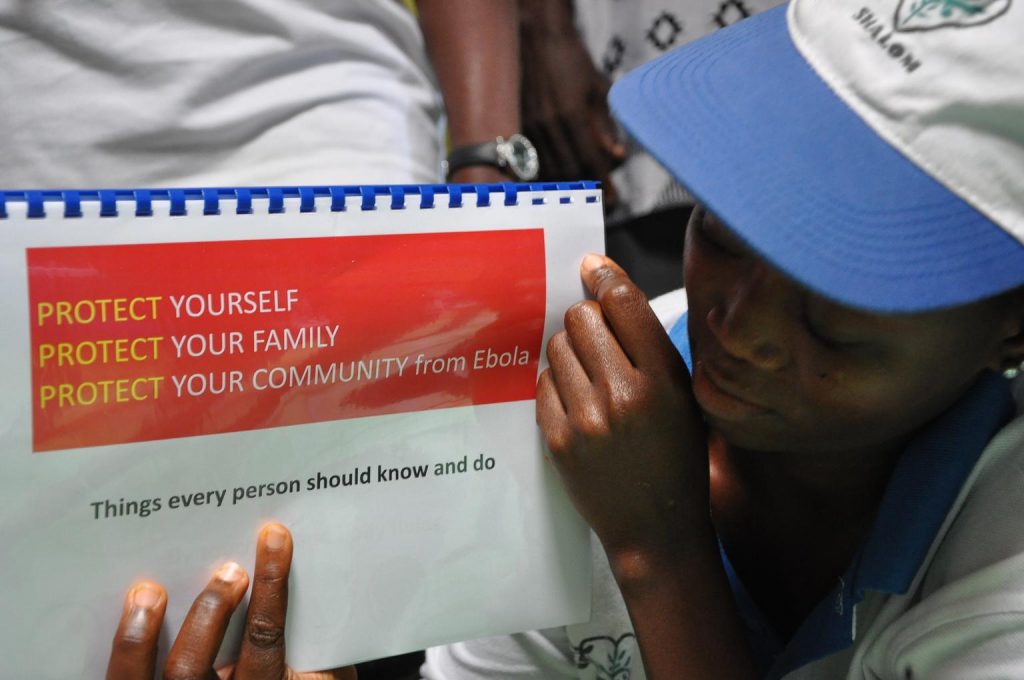Failings during the early months of the Ebola outbreak caused the epidemic to become an unprecedented health crisis in West Africa. This cannot be repeated.
Evidence Reviews
Using Media and Communication to Respond to Public Health Emergencies: Lessons Learned from Ebola

UNICEF/UNI171709/Scott
On 27 August, UNICEF conducted a Training of Trainers or ToT on Ebola outreach for over 50 adolescent girls, boys and community leaders in West Point and New Kru Town - two communities in Monsterrado County that have experienced high rates of Ebola infections. UNICEFs primary targets during these ToTs were members of agency-supported girls clubs. Since the ToTs, a total of 300 girls have been trained and deployed by UNICEFs implementing partners to conduct outreach in the two communities. All 300 have been equipped with flipbooks and posters to support their door-to-door efforts. UNICEF is proud of the role these young leaders are playing in the fight against Ebola. In this photo, a member of the New Kru Town girls club shows off her recently acquired flipbook.
Nearly six months since the start of the first Ebola outbreak, over 3,500 suspected, probable and confirmed Ebola cases have been reported in all of Liberias 15 counties, including in the capital city of Monrovia. Alarmingly, this figure reflects an 11-fold increase in cases in the last two months alone. Sixty per cent of the probable and confirmed cases have resulted in death and, as of 26 September, 183 health workers had been affected by the disease and 92 of them had died. Raising awareness and encouraging key behaviour changes are two major tactics in the battle against this deadly disease, but they are not the only tactics. Ensuring Liberians are equipped with the hygienic materials they need to protect themselves against the virus; that Ebola Treatment Units (ETUs) and general health facilities are stocked with life-saving medical, hygienic and sanitation supplies; and that people affected by Ebola, including children, receive the support they need to reintegrate into society and lead productive lives, are all equally important interventions. UNICEF Liberias Health, Water, Sanitation and Hygiene (WASH), Supply and Child Protection experts are all heavily engaged in these
Related content
Briefing
Key Considerations: Child Engagement in the Context of Disease Outbreaks in Eastern and Southern Africa
Effective child engagement strategies are essential to optimise the response to disease outbreaks and minimise their impact while ensuring children’s protection, well-being and resilience. When children understand disease outbreaks, they are better able to cope, contribute and recover. This promotes…
Central and East Africa Hub
SSHAP
2024
Briefing
Key Considerations for Responding to Floods in South Sudan Through the Humanitarian-Peace-Development Nexus
In common with many other African countries, the Republic of South Sudan is increasingly experiencing devastating floods linked to climate change.1,2 The Indian Ocean Dipole (IOD) and El Niño regulate the climate of Equatorial Eastern Africa. In 2019, a dipole…
Central and East Africa Hub
SSHAP
2024
Report
Conflict-Sensitive Returns and Integration in South Sudan
Since fighting flared up in Sudan in April 2023, an estimated 8.2 million Sudanese have been forcibly displaced, out of which 1.7 million are hosted by neighbouring countries, including 588,711 people by South Sudan.1 At the same time, an estimated…
Central and East Africa Hub
2024
Briefing
Key Considerations: Social, Structural and Community Dynamics of Cholera Transmission and Mortality in Ethiopia
The current cholera outbreak in the Federal Democratic Republic of Ethiopia began in August 2022. As of April 2024, active outbreaks had been recorded in most regions of the country, including: Amhara; Dire Dawa; Harari; Oromia; Southern Nations, Nationalities and…
Central and East Africa Hub
SSHAP
2024


